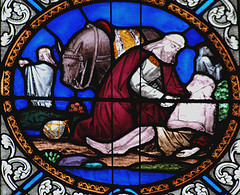In last Sunday’s Gospel, Jesus tells the parable of the servants watching over their master’s house while he is away (Luke 12:32-48). There are two verses that really struck a chord with me and relate to many of my earlier articles and rosary meditations:
Be sure of this: if the master of the house had known the hour when the thief was coming, he would not have let his house be broken into. You also must be prepared, for at an hour you do not expect, the Son of Man will come.
These verses stress the importance of always being prepared. But it raises these interesting questions. For what do we prepare? And how do we prepare? I think the traditional reading of this Gospel is that we prepare for our final judgement once we die. We are like the servants while Jesus is the master. One day the master will return and we will have to account for what we have done. The Second Glorious Mystery reminds us that Jesus ascended into Heaven and is seated at the right hand of God to judge the living and the dead. Since we do not know when our final judgement will come, we better be in a constant state of readiness. But while preparing for our final judgement is important, there are also other, more immediate reasons why we need to be prepared spiritually.
We should also prepare ourselves for the unexpected obstacles of this life. Similar to how Jesus said that we do not know the hour of our judgement, we also do not know the time or circumstances of great hardship. It may be the unexpected loss of a loved one, an illness, economic troubles, relationship issues, or just a sense of depression and despair. Often we cannot prevent such events from occurring. Since we cannot avoid hardship and trials in life it almost seems foolish to not prepare for them. As Jesus implies in the Gospel, only a foolish person would not defend his house if he knows thieves are coming. It is important to build a “reservoir of faith” so that we have the strength to endure the challenges life throws at us in the way Jesus expects from us.
We also prepare ourselves spiritually, not just to endure hardship, but also so we can do good when the opportunity arises. Thinking back to the story of The Good Samaritan, living a life of constant prayer enables us to spot those opportunities when we can help those in need. Personally, I know I sometimes live in my own little world and focus on my immediate needs. We often live where we look after ourselves first and maybe, if we have a little energy left over, we help our loved ones. And many of us have no energy or desire to help strangers or our enemies. But when our hearts and minds are truly prepared and aligned with God’s will we gain the ability to look past our immediate needs and see the needs of others.
There are many ways to prepare for the trials of this life, the judgement in the next, and to help those in need. I always talk about spiritual fitness in my posts. That is just another way of explaining how to prepare our souls for life’s challenges. Much like how push ups build physical muscle, prayer and the sacraments build spiritual muscle. Meditation, reading the Bible, and (of course) praying the Holy Catholic rosary all help galvanize our defenses against sin and resist the false promises of satan. Like exercise, the earlier we start praying and the more consistently we do it the stronger we will be in the long run. We will have that extra energy to go that extra mile and help those who need it the most. So ask yourself, are you prepared?
Related articles by Zemanta
- Basis of Salvation and Faith (anointedplace.wordpress.com)
- The Journey Is Important – Avoid The Short Cuts (pastorpaulvbsblog.blogspot.com)
- We Need The Holy Spirit! (pastorpaulvbsblog.blogspot.com)
- Suffering is the Christian’s Path to Glory (anointedplace.wordpress.com)
- Homily for August 8, 2010: 19th Sunday in Ordinary Time (beliefnet.com)




